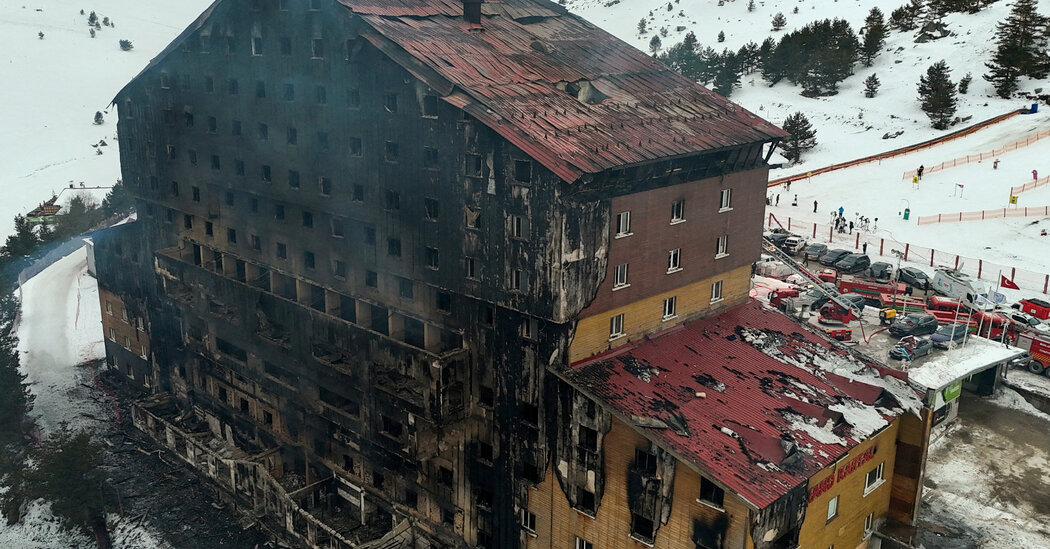The first indication that tragedy had stricken their loved ones came around 5:30 a.m. in urgent messages to the family’s WhatsApp group.
A brother and sister, trapped inside a ski lodge in Turkey that had caught fire, were pleading for help.
“Save us,” they wrote, their uncle, Ozgur Turkmen, said in a phone interview. “We cannot reach our parents. There are no fire brigades.”
Within hours, the siblings and their parents were dead.
They were among the at least 79 people killed on Tuesday when a predawn blaze broke out in the Grand Kartal Hotel at a ski resort 180 miles east of Istanbul.
As the fire tore through the 12-story lodge surrounded by snow-capped peaks, guests who had come during Turkey’s winter break for ski vacations and the workers staying there found themselves inundated by thick smoke and struggling to escape.
Multiple survivors have said that they heard no fire alarms and could not find fire escapes. A Turkish engineers union said in a statement that photos from inside the hotel before the blaze showed no signs of a sprinkler system, which was supposed to have been installed years ago.
The sudden death of so many people during what was supposed to be a joyful winter trip has caused grief and outrage among survivors and relatives, some of whom have begun calling for accountability for officials who failed to ensure that the building was safe.
“I am angry, but I am suppressing it now,” Mr. Turkmen said. “I will first live my pain and then look for justice.”
Turkey’s justice minister said on Tuesday that prosecutors were investigating the blaze, and President Recep Tayyip Erdogan said that anyone whose negligence had led to the fire would be punished.
On Wednesday, attending a funeral near the resort for an extended family that lost 14 members in the fire, Mr. Erdogan struck a somber tone.
“We were hurt. Our hearts were burned,” he said. “I wish for patience for the family and for our nation.”
The hotel was within walking distance to the slopes and provided amenities aimed at pampering the upper-middle-class families who vacationed there. Some returned with their children year after year.
It offered hot-stone and deep-tissue massages and had a playroom and indoor swimming pool. Its cozy, wood-paneled bar and restaurant had nooks for curling up near fireplaces.
The identities of those killed in the fire — reported in mournful statements and social media posts by colleagues, relatives, schools they attended and clubs they belonged to — indicated mostly affluent professionals, many alongside their children or other family members.
They included: A business school dean and his daughter. A 10-year-old competitive swimmer and her mother. Sixth- and ninth-grade siblings and their mother; the father survived. Brothers who were managers at an energy company, and one son each. An orthodontist, her husband and their two children. Two cooks who worked in the hotel.
Among those being mourned at the funeral that Mr. Erdogan attended was Zehra Gultekin, who worked in sales at Turkish Airlines. She died in the fire along with her husband, their four children and nine other relatives.
Mr. Turkmen, whose niece and nephew had messaged relatives for help, said they had been on vacation with their father, Nedim, an accountant and newspaper columnist, and their mother, Ayse, a workplace-safety expert.
The family loved the hotel and had returned to it every winter for more than a decade, he said.
The daughter, Ala Dora, 18, was in her last year of high school and had intended to study English or social sciences in Britain.
Her brother, Yuce Ata, 22, had earned an economics degree in London and returned to Turkey to start a trade business.
She skied. He snowboarded.
When other relatives saw the siblings’ messages, Mr. Turkmen said, they called him and he drove to the hotel. He later received his relatives’ bodies, and it appeared that they had been trying to flee when they perished.
“The key card was in my brother’s pocket, and he took cash,” Mr. Turkmen said. “My sister-in-law had her clothes on.”
Deniz Bilici Gocmen, who was Nedim’s editor at Sozcu newspaper, said in a phone interview that she had grown tired of disasters in Turkey causing what should have been avoidable deaths.
“As a citizen, I go to bed each night thinking about what I am going to wake up to each morning,” she said, recalling recent earthquakes and a deadly coal mine explosion.
“Such grave and heavy losses,” she said.





